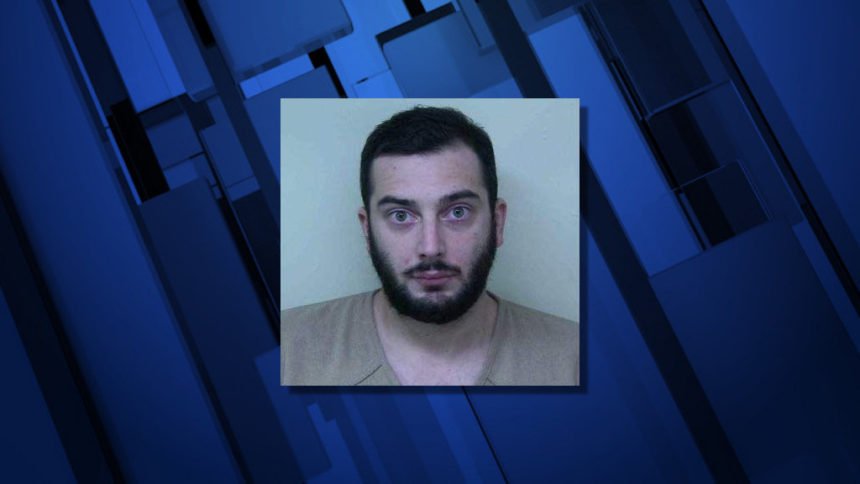Judge awards $21.5 million to man left paralyzed in 2017 shooting at Prineville bar

With gunman in prison, amount of award victim could receive is unknown
PRINEVILLE, Ore. (KTVZ) – A Crook County judge has awarded a judgement of more than $21.5 million to a Bend man left paralyzed below the waist when he was shot three times in the back at a Prineville bar on New Year's Eve 2017.
Circuit Judge Annette Hillman early last month signed the default judgment and money award sought by Nicholas Ricks, who was 38 at the time of the Dec. 31, 2017 shooting, against Omar Ramzi Araim, then 26, at the Crossroads BBQ Pit & Pub.
Araim surrendered to authorities three days after a warrant was issued for his arrest.
Personal injury attorney Tim Williams said Wednesday that Rick suffered severe and permanent injuries in the nearly fatal shooting,
The lawsuit, filed about two years later, sought $21.5 million for compensation for medical injuries and complications stemming from the shooting, which left Ricks paralyzed from the waist down.
“This injury is about as bad as they get," said Williams, managing partner of Dwyer Williams Cherkoss Attorneys and lead lawyer representing Ricks.
"Mr. Ricks, who is about the nicest guy you will ever meet, was senselessly shot as he was attempting to break up an altercation at a bar between two women," Williams said in a news release announcing the settlement.
"All he was trying to do is help, yet he paid a grave price for his altruism," the attorney said. "Once a very active man who worked hard and played hard with his kids is now left bound to a wheelchair for the rest of his life. It is sad, on an epic proportion.”
As detailed in the lawsuit, Ricks helped to break up a fight between two women, including Araim's girlfriend. A short time later, Araim left the bar, got a handgun from his truck, re-entered the bar and approached the group.
Just as Ricks had finished peacefully breaking up the altercation, Araim shot Ricks several times in the back. Williams said Araim had not been drinking nor using drugs at the time.
The lawsuit detailed Ricks' numerous injuries from the shooting, including damage to muscles, ligaments, tendons, nerves, abdomen, spine, lumbar region and his right arm. The gunshots shattered his L1 and L2 vertebrae, causing complete paralysis of the bladder, bowel, pelvis and legs.
Ricks spent four months at St. Charles Bend, nearly dying several times from blood clots, organ failure and infection, the attorney said. To date, he’s had 16 surgeries, and continues to suffer with severe pain and emotional distress.
“The court’s award represents all the civil justice system is able to provide – monetary relief for devastating and life altering injuries,” Williams explained.
“While no amount of money is worth the suffering Mr. Ricks has gone through and will continue to go through for the rest of his life, it is the only recourse available to those injured by the senseless acts of others," he said. "To the extent any of the judgment can be recovered from the defendant, it will help Mr. Ricks and his family maintain some semblance of their former life.”
Araim pleaded guilty in December 2018 to attempted murder and five counts of recklessly endangering another person. He was sentenced to an 80-month prison term, meaning he won't be eligible for release from the Snake River Correctional Institution until 2024.
Williams said Araim refused to participate from prison in the proceedings regarding the civil lawsuit, "so we placed him in default this spring. He still refused to participate, so we took a default judgment against him."
"Unfortunately for Mr. Ricks, given the facts of the case, including the extensive police investigation, there were no other people liable for the shooting," the attorney added.
"The defendant was not overserved, nor was he intoxicated. He did not give the bar staff time to observe he had a gun, nor react," Williams said. "Simply put, to try to go after the bar would have been frivolous."
"We are now looking at options to enforce the judgment against him, to the extent he still has assets and can pay," he added. "If he moved assets to avoid his liability, we plan to file a fraudulent transfer action against him as well, and unwind any such transfer of funds."
Still, Williams acknowledged, "The odds that we will be able to track down anything substantial (in assets) are slim to none."
